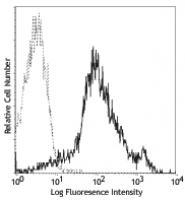FITC anti-mouse/human CD44;Isotype:Rat IgG2b, κ;Reactivity:Mouse, Human, Cross-Reactivity: Ba
详细描述
|  | ||||||||||||||
| Description | CD44 is a 80-95 kD glycoprotein also known as Hermes, Pgp1, H-CAM, or HUTCH. It is expressed on all leukocytes, endothelial cells, hepatocytes, and mesenchymal cells. As B and T cells become activated or progress to the memory stage, CD44 expression increases from low or mid levels to high levels. Thus, CD44 has been reported to be a valuable marker for memory cell subsets. High CD44 expression on Treg cells has been associated with potent suppressive function via high production of IL-10. CD44 is an adhesion molecule involved in leukocyte attachment to and rolling on endothelial cells, homing to peripheral lymphoid organs and to the sites of inflammation, and leukocyte aggregation. |
| Formulation | test sizes: Phosphate-buffered solution, pH 7.2, containing 0.09% sodium azide and 0.2% (w/v) BSA (origin USA).microg sizes: Phosphate-buffered solution, pH 7.2, containing 0.09% sodium azide. |
| Recommended Usage | Each lot of this antibody is quality control tested by immunofluorescent staining with flow cytometric analysis. For flow cytometric staining using the microg size, the suggested use of this reagent is ≤0.25 microg per million cells in 100 microL volume. Test size products are transitioning from 20 microL to 5 microL per test. Please check your vial or your CoA to find the suggested use of this reagent per million cells in 100 microL staining volume or per 100 microL of whole blood. It is recommended that the reagent be titrated for optimal performance for each application. |
| References | 1. Trowbridge IS, et al. 1982. Immunogenetics 15:299. (ICFC, IP, CMCD) |

